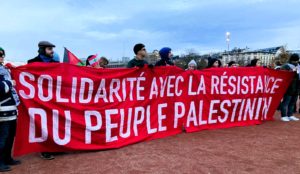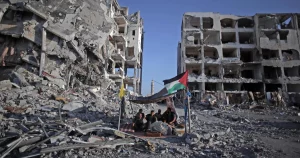Two of the words that we should try to avoid when writing about refugees are “unprecedented” and “crisis.” They are used far too often and with far too little thought by many people working in the humanitarian sector. Even so, and without using those words, there is evidence to suggest that the risks confronting refugees are perhaps greater today than at any other time in the past three decades.
First, as the UN Secretary-General has pointed out on many occasions, we are currently witnessing a failure of global governance. When Antonio Guterres took office in 2017, he promised to launch what he called “a surge in diplomacy for peace.” But over the past three years, the UN Security Council has become increasingly dysfunctional and deadlocked, and as a result is unable to play its intended role of preventing the armed conflicts that force people to leave their homes and seek refuge elsewhere. Nor can the Security Council bring such conflicts to an end, thereby allowing refugees to return to their country of origin.
It is alarming to note, for example, that four of the five Permanent Members of that body, which has a mandate to uphold international peace and security, have been militarily involved in the Syrian armed conflict, a war that has displaced more people than any other in recent years. Similarly, and largely as a result of the blocking tactics employed by Russia and the US, the Secretary-General struggled to get Security Council backing for a global ceasefire that would support the international community’s efforts to fight the Coronavirus pandemic
Second, the humanitarian principles that are supposed to regulate the behavior of states and other parties to armed conflicts, thereby minimizing the harm done to civilian populations, are under attack from a variety of different actors. In countries such as Burkina Faso, Iraq, Nigeria and Somalia, those principles have been flouted by extremist groups who make deliberate use of death and destruction to displace populations and extend the areas under their control.
In states such as Myanmar and Syria, the armed forces have acted without any kind of constraint, persecuting and expelling anyone who is deemed to be insufficiently loyal to the regime or who come from an unwanted part of society. And in Central America, violent gangs and ruthless cartels are acting with growing impunity, making life so hazardous for other citizens that they feel obliged to move and look for safety elsewhere.
Third, there is mounting evidence to suggest that governments are prepared to disregard international refugee law and have a respect a declining commitment to the principle of asylum. It is now common practice for states to refuse entry to refugees, whether by building new walls, deploying military and militia forces, or intercepting and returning asylum seekers who are travelling by sea.
In the Global North, the refugee policies of the industrialized increasingly take the form of ‘externalization’, whereby the task of obstructing the movement of refugees is outsourced to transit states in the Global South. The EU has been especially active in the use of this strategy, forging dodgy deals with countries such as Libya, Niger, Sudan and Turkey. Similarly, the US has increasingly sought to contain northward-bound refugees in Mexico, and to return asylum seekers there should they succeed in reaching America’s southern border.
In developing countries themselves, where some 85 per cent of the world’s refugees are to be found, governments are increasingly prepared to flout the principle that refugee repatriation should only take place in a voluntary manner. While they rarely use overt force to induce premature returns, they have many other tools at their disposal: confining refugees to inhospitable camps, limiting the food that they receive, denying them access to the internet, and placing restrictions on humanitarian organizations that are trying to meet their needs.
Fourth, the COVID-19 pandemic of the past nine months constitutes a very direct threat to the lives of refugees, and at the same time seems certain to divert scarce resources from other humanitarian programmes, including those that support displaced people. The Coronavirus has also provided a very convenient alibi for governments that wish to close their borders to people who are seeking safety on their territory.
Responding to this problem, UNHCR has provided governments with recommendations as to how they might uphold the principle of asylum while managing their borders effectively and minimizing any health risks associated with the cross-border movement of people. But it does not seem likely that states will be ready to adopt such an approach, and will prefer instead to introduce more restrictive refugee and migration policies.
Even if the virus is brought under some kind of control, it may prove difficult to convince states to remove the restrictions that they have introduced during the COVD-19 emergency. And the likelihood of that outcome is reinforced by the fear that the climate crisis will in the years to come prompt very large numbers of people to look for a future beyond the borders of their own state.
Fifth, the state-based international refugee regime does not appear well placed to resist these negative trends. At the broadest level, the very notions of multilateralism, international cooperation and the rule of law are being challenged by a variety of powerful states in different parts of the world: Brazil, China, Russia, Turkey and the USA, to name just five. Such countries also share a common disdain for human rights and the protection of minorities – indigenous people, Uyghur Muslims, members of the LGBT community, the Kurds and African-Americans respectively.
The USA, which has traditionally acted as a mainstay of the international refugee regime, has in recent years set a particularly negative example to the rest of the world by slashing its refugee resettlement quota, by making it increasingly difficult for asylum seekers to claim refugee status on American territory, by entirely defunding the UN’s Palestinian refugee agency and by refusing to endorse the Global Compact on Refugees. Indeed, while many commentators predicted that the election of President Trump would not be good news for refugees, the speed at which he has dismantled America’s commitment to the refugee regime has taken many by surprise.
In this toxic international environment, UNHCR appears to have become an increasingly self-protective organization, as indicated by the enormous amount of effort it devotes to marketing, branding and celebrity endorsement. For reasons that remain somewhat unclear, rather than stressing its internationally recognized mandate for refugee protection and solutions, UNHCR increasingly presents itself as an all-purpose humanitarian agency, delivering emergency assistance to many different groups of needy people, both outside and within their own country. Perhaps this relief-oriented approach is thought to win the favour of the organization’s key donors, an impression reinforced by the cautious tone of the advocacy that UNHCR undertakes in relation to the restrictive asylum policies of the EU and USA.
UNHCR has, to its credit, made a concerted effort to revitalize the international refugee regime, most notably through the Global Compact on Refugees, the Comprehensive Refugee Response Framework and the Global Refugee Forum. But will these initiatives really have the ‘game-changing’ impact that UNHCR has prematurely attributed to them?
The Global Compact on Refugees, for example, has a number of important limitations. It is non-binding and does not impose any specific obligations on the countries that have endorsed it, especially in the domain of responsibility-sharing. The Compact makes numerous references to the need for long-term and developmental approaches to the refugee problem that also bring benefits to host states and communities. But it is much more reticent on fundamental protection principles such as the right to seek asylum and the notion of non-refoulement. The Compact also makes hardly any reference to the issue of internal displacement, despite the fact that there are twice as many IDPs as there are refugees under UNHCR’s mandate.
So far, the picture painted by this article has been unremittingly bleak. But just as one can identify five very negative trends in relation to refugee protection, a similar number of positive developments also warrant recognition.
First, the refugee policies pursued by states are not uniformly bad. Countries such as Canada, Germany and Uganda, for example, have all contributed, in their own way, to the task of providing refugees with the security that they need and the rights to which they are entitled. In their initial stages at least, the countries of South America and the Middle East responded very generously to the massive movements of refugees out of Venezuela and Syria.
And while some analysts, including the current author, have felt that there was a very real risk of large-scale refugee expulsions from countries such as Bangladesh, Kenya and Lebanon, those fears have so far proved to be unfounded. While there is certainly a need for abusive states to be named and shamed, recognition should also be given to those that seek to uphold the principles of refugee protection.
Second, the humanitarian response to refugee situations has become steadily more effective and equitable. Twenty years ago, it was the norm for refugees to be confined to camps, dependent on the distribution of food and other emergency relief items and unable to establish their own livelihoods. Today, it is far more common for refugees to be found in cities, towns or informal settlements, earning their own living and/or receiving support in the more useful, dignified and efficient form of cash transfers. Much greater attention is now given to the issues of age, gender and diversity in refugee contexts, and there is a growing recognition of the role that locally-based and refugee-led organizations can play in humanitarian programmes.
Third, after decades of discussion, recent years have witnessed a much greater engagement with refugee and displacement issues by development and financial actors, especially the World Bank. While there are certainly some risks associated with this engagement (namely a lack of attention to protection issues and an excessive focus on market-led solutions) a more developmental approach promises to allow better long-term planning for refugee populations, while also addressing more systematically the needs of host populations.
Fourth, there has been a surge of civil society interest in the refugee issue, compensating to some extent for the failings of states and the large international humanitarian agencies. Volunteer groups, for example, have played a critical role in responding to the refugee situation in the Mediterranean. The Refugees Welcome movement, a largely spontaneous and unstructured phenomenon, has captured the attention and allegiance of many people, especially but not exclusively the younger generation.
And as has been seen in the UK this year, when governments attempt to demonize refugees, question their need for protection and violate their rights, there are many concerned citizens, community associations, solidarity groups and faith-based organizations that are ready to make their voice heard. Indeed, while the national asylum policies pursued by the UK and other countries have been deeply disappointing, local activism on behalf of refugees has never been stronger.
Finally, recent events in the Middle East, the Mediterranean and Europe have raised the question as to whether refugees could be spared the trauma and hardship of making dangerous journeys from one country and continent to another by providing them with safe and legal routes. These might include initiatives such as Canada’s community-sponsored refugee resettlement programme, the ‘humanitarian corridors’ programme established by the Italian churches, family reunion projects of the type championed in the UK and France by Lord Alf Dubs, and the notion of labour mobility programmes for skilled refugee such as that promoted by the NGO Talent Beyond Boundaries.
Such initiatives do not provide a panacea to the refugee issue, and in their early stages at least, might not provide a solution for large numbers of displaced people. But in a world where refugee protection is at such serious risk, they deserve our full support.
This Opinion piece was penned by Jeff Crisp, Refugee Studies Centre, University of Oxford.
Views expressed in this opinion piece do not necessarily reflect those of UAI.
Photo: Several Rohingya men pass food supplies dropped by a helicopter to others aboard a boat drifting in Thai waters in the Andaman Sea on May 14, 2015. Credit © UNHCR/Christophe Archambault











